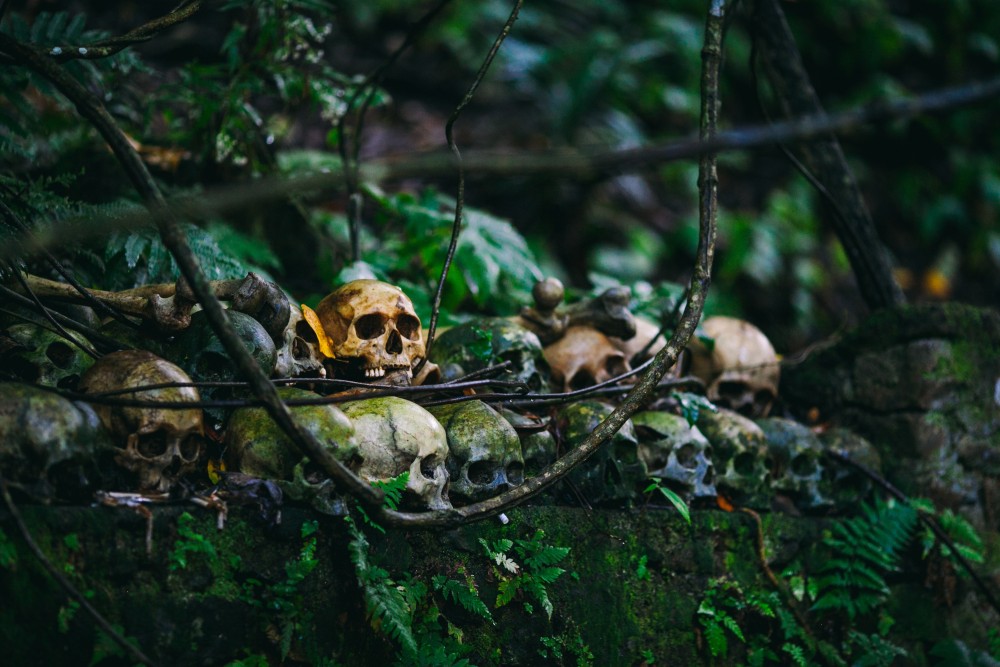The Boston Declaration and God’s monstrous entourage
People do terrible things. So does the biblical God. Is there value in naming those things?

Each November, I attend the AAR/SBL annual meeting, a gathering of 10,000 religion scholars who meet to share their research. Last year’s meeting, held just weeks after the presidential election, felt downright mournful. It felt to me as if a large group of horrified and shocked white liberals were being suddenly and swiftly educated out of our naiveté by a small group of non-white liberals who kindly refrained from rolling their eyes as they patiently rehearsed for us (yet again) the long history of white supremacy and reminded us (yet again) of our complicity in it.
This year, the meeting had a more upbeat feel. It’s not that the topics were inherently more upbeat. Many of the sessions still focused on the collective sins of our era: racism, violence, forced migration, and poverty. But the conference participants seemed less paralyzed by grief this year and more prepared to take action.
A few days into the meeting, a group of Christian scholars gathered at Boston’s Old South Church, a few blocks away from the convention center where the conference was being held. Some of them wore sackcloth and ashes (literally) as they presented the Boston Declaration, a statement signed by nearly 200 scholars, pastors, and activists that denounces Christian complicity in “poverty, economic exploitation, racism, sexism, and all forms of oppression” and calls on Christians to reflect the life and love of God by working actively against these systemic sins: “We affirm the beauty and humanity of all people in their manifold difference—race, ethnicity, gender, sexuality, and religion—as reflecting God’s image through lives of love and hope.”
Like the Barmen Declaration after which it’s modeled, the Boston Declaration condemns idolatrous ideologies that have been taken up by the church. Unlike the Barmen Declaration, the Boston Declaration explicitly names the sins that result from those ideologies. Reading a lengthy list of all the terrible things people do to one another can feel disheartening. But that’s precisely the point. Silence about sin allows for illusions of innocence, which lead to complicity. Complicity leads to complacency. And complacency is what the Boston Declaration is working against:
Action on the part of the church is warranted at a time when women, people of color, and various ethnicities, individual religions, immigrants and distinct sexualities are targeted for slander and violence from the highest offices of government. We cannot sit idly by and allow the people and the earth to be accosted with series after series of unjust policies that allow the interest of corporate profits to expunge the future for coming generations of humans and other living species.
While the Boston Declaration was being released, I was a few blocks away in the convention center, listening to a talk by Esther Hamori called “The Biblical God and His Company of Monsters.” It was the first of a group of presentations on the intersections between religion and monster theory. (Yes, you read that right. Monster theory, apparently, is a thing.)
Hamori’s talk was fascinating, funny, and frightening all at the same time. In the Hebrew Bible, God is surrounded by an entourage composed of various monsters who do his dirty work for him. This work includes wounding and killing, as in the case of the seraphim of Isaiah 6 and Numbers 21 (“God has just committed mass execution by snake”); torture, as when the Satan inflicts painful sores on Job; and manipulation, as exemplified by the “malevolent spirit” who entices King Ahab to die in battle through the words of the lying prophets (I Kings 22). The members of the divine entourage protect boundaries (as when the cherubim guard the gates of the Garden of Eden to keep Adam and Eve from re-entering) but they also transgress boundaries (as when angels morph between human form and non-human forms—a pillar of fire or the heavenly host). Hamori’s crucial point was that these monsters, who are “lurking manifestations of the unheimlich” (to use the language of one monster theorist), kill and maim at God’s command.
There was something refreshing about Hamori’s blunt enumeration of God’s crimes. It’s as if she were uncovering God’s Unheimlichkeit for all to see. The point of this uncovering wasn’t simply to shatter idolatrous views of God as tame and comfortable. It was to help us contend with the understanding held by the people who wrote the Bible (as well as the people who passed down the older myths that the biblical authors knew) that there might be something incredibly uncanny, even creepy, about the gap between our ideals and the way we see reality playing out before us.
This kind of honesty calls us to the same accountability that the Boston Declaration demands of us. We should be horrified by the thought of God sending the Destroyer to kill some children and not others. But we should also be horrified by the fact that we privilege white children above black children, and by the reality that our country’s denial of refugees at the borders means that some of them will die. Like the uncanny, these sins are simultaneously obvious and hidden in our culture. Uncovering them—naming the monsters—isn't enough. But it's the first step toward defeating them.





